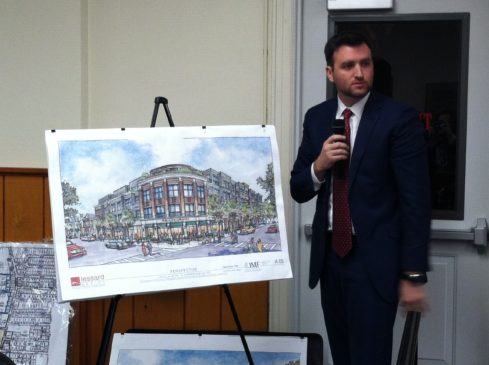
[slideshow_deploy id=’899′]
BY JOHN SNYDER
OF PASCACK PRESS
EMERSON, N.J.—Yes, it’s true, the borough’s threat of eminent domain against owners of 188 and 214 Kinderkamack Road, home to Cinar Turkish Restaurant, Cork & Keg Liquor, and Ranch Cleaners in Block 419, is lifted, and related lawsuits are being dismissed.
According to Richard P. DeAngelis Jr., attorney for the property owners, his clients reached an agreement to sell their properties to borough redevelopment partner JMF Properties through its affiliate Emerson Redevelopment Urban Renewal (ERUR), clearing the way for JMF to submit a site plan for Land Use Board review.
DeAngelis told Pascack Press that the agreements were signed the afternoon of Saturday, Oct. 27 and initial deposits were received Monday, Oct. 29.
DeAngelis, who specializes in eminent domain law, redevelopment, and property tax appeals, said that the owners were pressured to sell.
“The owners have had to live with a cloud of condemnation hanging over their properties for nearly three years. They have been forced to incur substantial legal fees in defending their properties in court over the last 18 months,” he said Oct. 29.
He added, “Because of the prospect of continued litigation, the owners agreed to negotiate. They wanted to see this matter end, provided they could agree on fair and reasonable terms.”
Depending on one’s view, the development is a pre-election coup for Mayor Louis Lamatina, who has championed the scope of the plan and has been asserting that the threat of eminent domain was a court mandate; or else it’s proof of an overreach and the wrong direction for Emerson, as his challenger in the mayoral race, Councilwoman Danielle DiPaola, has been arguing.
The purchases were all that stood in the way for JMF to take next steps on its mixed-use project: retail stores, 147 apartments, and a parking garage on Kinderkamack Road between Lincoln Boulevard and Linwood Avenue.
The project seeks luxury living and 20,000 square feet of retail that could net approximately $2.5 million in annual rental income. Plans also call for a set-aside of 22 to 29 low- to moderate-income housing units at the site.
The deals complete a first step of the redevelopment agreement, signed June 10, 2016, and delayed as ERUR litigated with the holdout property owners.
According to that agreement, a contract between the borough and ERUR, the redeveloper is required to submit applications and plans for review before building approvals commence.
Site work can begin after permit approvals. The redeveloper agreed to commence construction within 120 days following approvals.
In addition to building the project, ERUR agreed to install curbing, sidewalks, roadways, sewers, drainage, grading, street lighting and “furniture,” signage, utilities, and plantings, to provide for appropriate traffic control signals, and to install a 42-inch drainage line from Linwood Avenue to Lincoln Boulevard.
According to the redeveloper’s application for a long-term tax-exemption from August 2016, the payment in lieu of taxes (PILOT) was estimated to be $358,390 annually.
Total expenses at that time, were estimated at $1.21 million, including the PILOT.
Project planners submitted documents at that time saying they expected to draw $3.64 million in annual revenue from the project—including $1,700 each from eight studio apartments, between $1,900 or 2,000 each for 104 one-bed room apartments, and $2,100 each for 20 two bedrooms.
Fifteen affordable two-bedroom apartments were touted at drawing $900 each. Project planners also estimated $407,200 in annual retail rental revenue at $20 per square foot on 20,360 square feet.
As the retail concept grew, there was an agreement to explore siting final outstanding affordable housing elsewhere in town.

Town property part of deal
In the 2016 redeveloper agreement, the Borough of Emerson said it would hand over property—its Block 419 Lot 7, now used as the Emerson Volunteer Ambulance Corps—for a “fair market value” of $500,000.
In exchange, the redeveloper agreed to construct an emergency municipal services building at its sole cost, up to $500,000. The borough agreed to provide site plans and property for this new facility.
In the event costs exceed that amount, both the borough and redeveloper agreed to mutually select a retired Bergen County judge to mediate the cost.
The borough purchased two properties on Locust Avenue that could be utilized, and the governing body has debated concepts for Emerson’s current borough hall, which the state says is eligible to apply for a spot on the State Register of Historic Places but a borough consultant called practically functionally obsolete.
The redevelopment project was initially estimated to be finished by March 2019, but the lawsuits delayed the anticipated project approvals—originally estimated for March 2017—by nearly 20 months.
Lamatina called it
Lamatina declared related lawsuits against the borough all but dismissed Oct. 16 when the council voted, 4-0-1, to authorize him to sign memorandums of agreement with all parties.
“JMF has agreed to purchase those properties and the Borough will no longer consider eminent domain, which was required in order to settle with Fair Share Housing. Importantly, all lawsuits will be dismissed against the Borough challenging our settlement and the redevelopment of our downtown,” Lamatina said at the time.
The MOAs refer to purchase and sale agreements with ERUR, established equally in 2016 by Giuseppe Forgione and Steven Kalafer, and have since been signed by Forgione; Alexander Lapatka, managing member for 214 Kinderkamack Properties LLC; and Deborah Agnello, attorney in fact for Della Volpe, trustee.
Forgione did not immediately return a call seeking comment on ERUR’s purchases.
According to the resolutions to sign the MOAs, “The parties have agreed to terms and conditions to resolve the designation challenge and arrange for the sale of the property.”
The MOAs say the property owners are being paid a nonrefundable 5 percent of the purchase price in exchange for agreeing to drop pending court cases and not speaking out against the project.
The MOAs also say that purchase/sale agreements (PSA) allow for due diligence periods of 30 days—after which a second nonrefundable 5 percent of the purchase price is due the sellers—then set a 60-day deadline to close.
ERUR may terminate the sales up to the end of the 30-day due diligence period.
The sellers may still walk if the developer seeks a reduction in purchase price, if ERUR fails to make the second deposit, or if ERUR fails to close the deal within the 60-day closing window.
Should the deals collapse, Emerson nevertheless agreed to rescind its designation of the properties as an area in need of redevelopment and the designation of the property as a condemnation redevelopment area.
Lamatina described the MOAs as “a win-win-win for all involved, especially the residents of our borough.”
That Oct. 16 announcement struck many observers as puzzling—though still others gave Lamatina claps on the back on social media—as there was no corroborating announcement of a sale, and none of the other parties had yet signed the MOAs alongside the borough.
On Monday, Oct. 29, Lamatina, Democrat, up for re-election against Republican challenger DiPaola, thanked “all who have assisted in moving this much needed revitalization of our downtown forward.”
He said JMF will pay 100 percent of the borough’s legal fees related to property acquisition. By law, it can not pay the borough’s fees to defend the redevelopment designation
“That being said, even with the legal fees we incurred to defend the owners’ lawsuits, there was a decrease in the municipal portion of the 2018 tax rate and no increase in 2016,” he added.
DiPaola: ‘Threat was un-American’
DiPaola abstained from the council vote for the MOAs, and has opposed the redevelopment project’s height and borough’s tactics, which involved the threat of eminent domain against the holdouts on the basis that their properties were blighted, a designation they challenged in court.
Asked for comment Oct. 31, DiPaola said, “Our mayor and council members claim they never wanted to use eminent domain, but in my opinion, they absolutely did. The looming threat of eminent domain held over property owners’ heads to force them to the table to sell properties that were never for sale is unconscionable—it’s un-American.”
She added, “They may congratulate themselves and convince some that this was good for Emerson, but in the end, property owners lost, business owners lost, and ultimately Emerson will lose when high density four-story buildings are erected in our downtown. I hope they’re as happy as the developers.”
